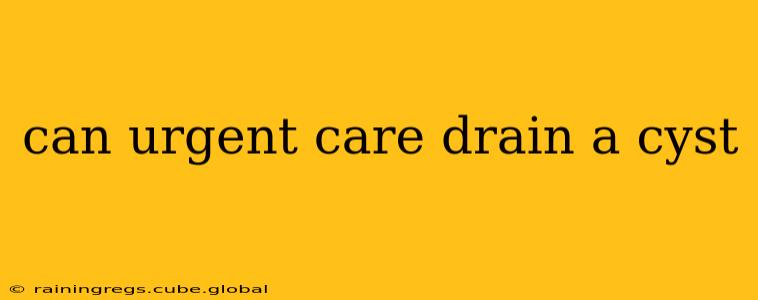Many people wonder if urgent care can drain a cyst. The answer is: sometimes, but not always. Whether or not an urgent care clinic can drain your cyst depends on several factors, including the type of cyst, its location, and the clinic's resources and the provider's expertise. Let's explore this further.
What is a Cyst?
Before we delve into whether urgent care can help, it's crucial to understand what a cyst is. A cyst is a sac-like pocket of tissue that's filled with fluid, air, or other substances. Cysts can develop almost anywhere in the body and vary significantly in size and type. Some are harmless and resolve on their own, while others require medical attention. The location and type of cyst greatly influence the treatment approach.
Types of Cysts and Urgent Care Treatment
Different types of cysts require different approaches. Some common types include:
-
Sebaceous cysts: These are common skin cysts that arise from blocked oil glands. Urgent care providers often have the capability to drain these, particularly if they're causing significant discomfort or infection.
-
Epidermoid cysts: Similar to sebaceous cysts, these are benign skin cysts that often require incision and drainage. Urgent care may be able to manage these, depending on size and location.
-
Pilonidal cysts: Located near the tailbone, these cysts can be more complex and may not be appropriately treated in an urgent care setting. Referral to a specialist might be necessary.
-
Ovarian cysts: These cysts develop on the ovaries and are usually diagnosed and managed by a gynecologist. Urgent care is unlikely to be equipped to handle this type of cyst.
-
Other cysts: Many other types of cysts exist, located in various parts of the body (e.g., breast cysts, kidney cysts). Urgent care is typically not the ideal setting for the diagnosis and management of these.
Can Urgent Care Drain a Cyst? A More Detailed Look
While some urgent care facilities can drain certain types of cysts, particularly superficial skin cysts like sebaceous or epidermoid cysts, it's not a guaranteed service. The decision rests on several factors:
-
Provider expertise: Not all urgent care providers have the experience or training to perform cyst drainage.
-
Clinic resources: The clinic must have the necessary sterile equipment and supplies to perform the procedure safely and effectively.
-
Cyst characteristics: Large, deep, or infected cysts may require more specialized care from a dermatologist or surgeon.
-
Potential complications: Improper drainage can lead to infection or other complications.
What Happens at Urgent Care if You Have a Cyst?
If you go to urgent care with a cyst, the provider will first assess the cyst, considering its location, size, appearance, and any associated symptoms (pain, redness, swelling, fever). They will determine if drainage is appropriate and safe in their setting. If not, they will likely recommend referral to a specialist, such as a dermatologist or surgeon.
What if Urgent Care Can't Drain My Cyst?
If the urgent care provider determines they cannot safely drain your cyst, they'll provide appropriate recommendations. This might involve:
-
Referral to a dermatologist or surgeon: For specialized care and potential surgical removal.
-
Observation and monitoring: If the cyst is small, asymptomatic, and not concerning, the provider might suggest monitoring it for any changes.
-
Medication: In some cases, antibiotics may be prescribed if infection is suspected.
How to Prepare for a Potential Cyst Drainage
While it's not always possible to know beforehand if an urgent care can drain a cyst, bringing relevant information can help. This includes any medical history, existing allergies, and details about your cyst (onset, symptoms, etc.).
In summary, while some urgent care clinics may be able to drain certain types of cysts, it's not a guarantee. It's always best to consult with a medical professional to determine the appropriate course of treatment. This assessment will ensure your safety and help you receive the best possible care for your specific situation. Do not attempt to drain a cyst at home.
